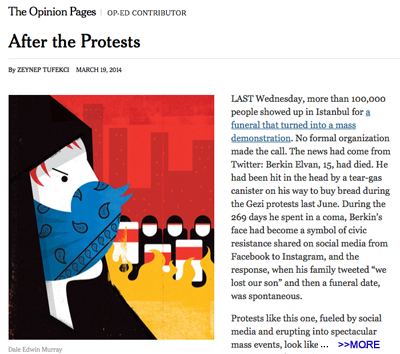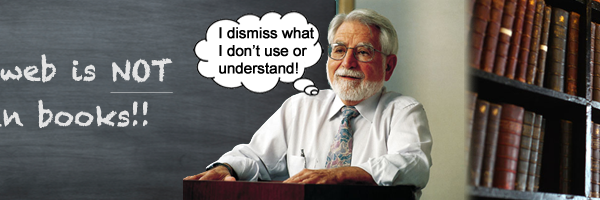An assistant college professor named Zeynep Tufekci published an OpEd in the New York Times with the theory that social media is as helpful for organizing protests as it is hurtful to them. Because her understanding of social media is more Snapchat than Reddit, she offers that the Occupy Wall Street rally and the Tahrir Square protests failed to keep our attention because they were not organized in a fashion similar to the good old days of paper pamphlets and phone calls. New media, in her view, does not build infrastructure for “sustaining momentum.”
In fact, building new types of media infrastructure to support social causes has taken on a new urgency in places like Turkey, where the citizens’ access to Twitter has been limited. Business Insider reports people are getting around the ban by using anonymous VPNs and working text messaging services. Any website manager will tell you how dramatically their clients’ causes have been burgeoned due to the construction of strategic media infrastructure that innovates their old newsletters and brochures. History has shown again and again that innovation in technology evolves the way we effect change within our institutions – we just can’t fully appreciate it at the time. Gutenberg invented the printing press in 1445, but it’s the pioneering of how this process was used that impacted all our social and religious institutions in the centuries following. Antonio Meucci should have been credited with inventing the telephone, but it was Alexander Graham Bell who is commonly credited with inventing the device that commoditized voice communications.
 Professor Zeynep Tufekci joins a list of nearsighted educators (yes, they were all teachers) who just couldn’t grasp the impact of technology and the Internet:
Professor Zeynep Tufekci joins a list of nearsighted educators (yes, they were all teachers) who just couldn’t grasp the impact of technology and the Internet:
- In 1995 physics teacher Clifford Stoll famously wrote an article for Newsweek predicting the Internet would fail: “The truth is, no online database will replace your daily newspaper, no CD-ROM can take the place of a competent teacher, and no computer network will change the way government works.”
- In 2007 media teacher Bruce Sterling was quoted in the New York Times:
“Using Twitter for literate communication is about as likely as firing up a CB radio and hearing some guy recite ‘The Iliad.’ ” - In 1997, Gordon College trustee Ken Olsen was quoted during a 1977 World Future Society meeting in Boston:
“There is no reason for any individual to have a computer in their home.” - In 1995, Robert Metcalfe, Professor at the University of Texas, published an article in InfoWorld with the following prediction:
“The Internet will soon go spectacularly supernova and in 1996 catastrophically collapse.”
New media like Twitter and Facebook, according to know-it-all academia, does not build infrastructure for “sustaining momentum.” Time will tell the story of their errors.


Spectacular cognitive dissonance.
I had to go look that up: the state of having inconsistent thoughts, beliefs, or attitudes, esp. as relating to behavioral decisions and attitude change.
I am cozy with the term as a result of having it flung in my direction- several times- during my more Luddite moments.
I think the teachers are trying there best to create conversation around this new media, which can be done by pointing out the flaws in the systems. They might come off strong, but it’s al okay.